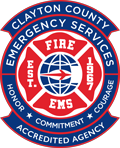When to Call 911
In the event of a medical emergency, calling 9-1-1 should typically be the first priority. An exception would be if an immediate action could be safely taken that would improve a person’s chances for survival. An example of this would be to remove a child submerged in water.
When calling 9-1-1, be prepared to verify your location. If available, a landline offers advantages over a cell phone as it automatically provides the 9-1-1 operator with the address you are calling from. Based on the nature of the emergency, the 9-1-1 operator may provide you with instructions for assisting the patient prior to Clayton County Fire & Emergency Services arrival. This may include direction on how to perform CPR or something as simple as rolling the patient on their side.
Once any pre-arrival instructions are complete, take action that may assist the Fire Department with finding you. This may be turning on a porch light or having someone meet the CCFES crew outside and direct them to the patient’s location. Lastly, remember 9-1-1 is for emergencies.
What types of Incidents should be reported to 911?
Any incident that threatens health, life, or property should be reported to 911. Crimes that are in progress, threatened or have already occurred as well as fires or medical problems requiring emergency assistance are some examples.
What types of incidents should NOT be reported to 911?
We encourage citizens to find alternative solutions to problems such as a cat in the tree, keys locked in a car, or power outages. The 911 center dispatches public safety personnel to emergency situations. In most cases, those personnel cannot assist with the problems mentioned above.
The 911 center is also not prepared to give directions, weather reports or answer questions about school closings. Remember, 911 is for emergencies. If the lines are tied up with non-emergency calls, you may not be able to get help as quickly as you need it in your own emergency.
What if I'm not sure whether my situation is an emergency or not?
We realize that most citizens do not have public safety training. Any time you think you need emergency assistance, or if you’re not sure, call us. We are trained to determine the severity of situations and send appropriate help.
Why does the 911 operator ask so many questions? If I call with an emergency, time is crucial. Isn't the operator wasting time by asking for so much information?
911 operators are trained to ask specific questions to determine the most appropriate response by public safety officers. Normally your call is taken by a call-taker who enters the information you give them into a computer system. Your call information is then automatically routed to the appropriate dispatcher who often times dispatches help to you before you ever hang-up with the call-taker.
What if something happens to me and I can't speak? How can 911 help me?
When you dial 911 from a traditional telephone, one that is wired into a house or other building, the location from which you are calling is displayed on a computer screen in front of the 911 operator. If you can not speak, either because of a communications impairment, illness, or crime in progress, a police officer is sent to the location to check for any trouble.
If you are ill or are being kept from talking by an intruder, leave the telephone off the hook. Any noise that we can hear will help us determine the most appropriate response. Often, in cases of domestic violence, the victim leaves the telephone off the hook and the call-taker was able to determine the nature of the situation more quickly and send the most appropriate law enforcement response.
I have a hearing impairment and cannot communicate over a regular telephone line. What should I do if I need help in an emergency?
Every 911 Operator at Clayton County has been trained on the proper use of a TDD/TTY. Our employees conduct several tests a week to ensure that not only are the machines working, but that they know how to answer and place TDD/TTY calls. There is never any need to dial a separate number for TTD/TTY calls or to place these calls through a relay service. If you need help, just dial 911. Your call will be placed on the TDD/TTY and handled just like a call from someone without a communications impairment.


